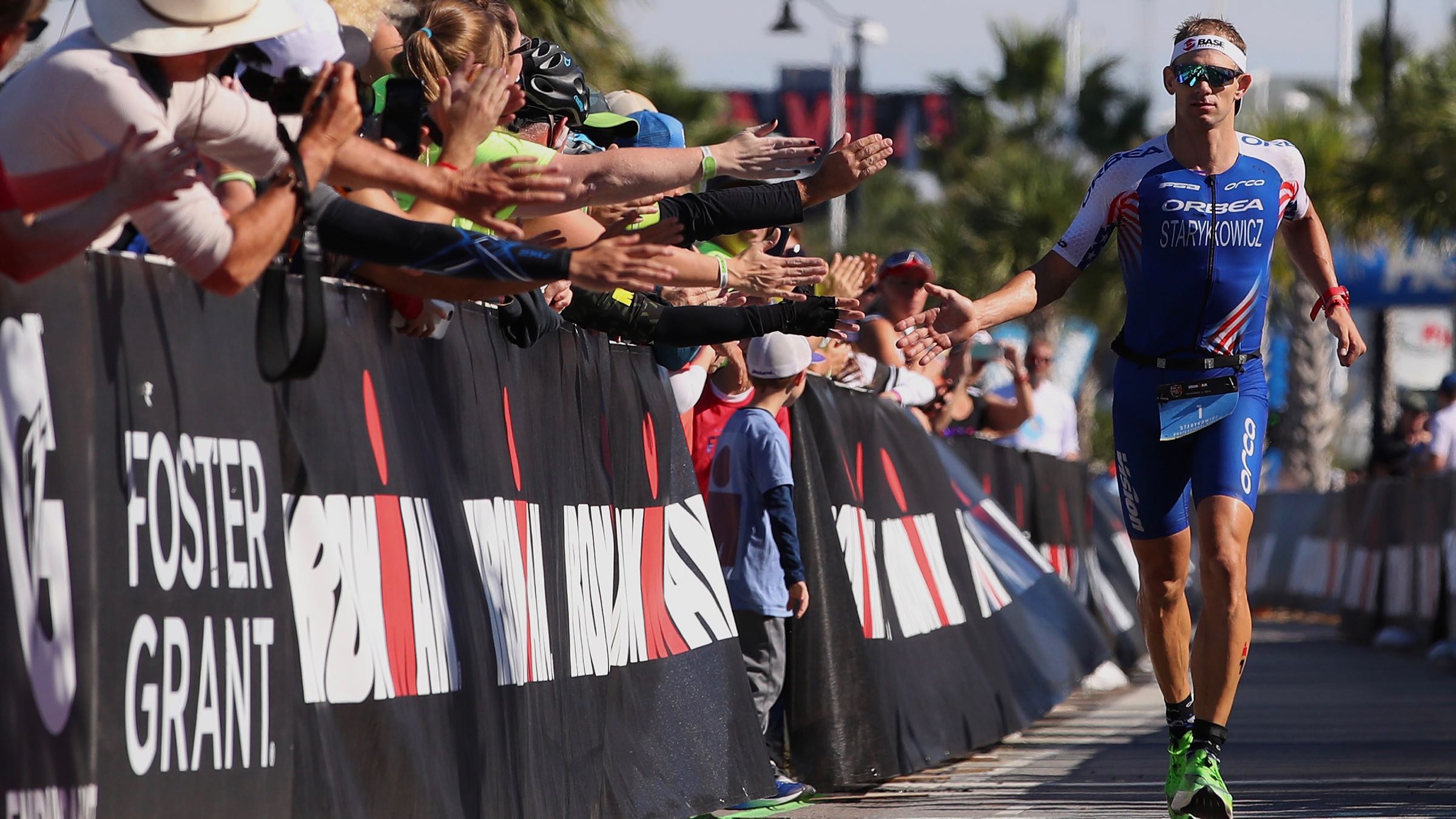Andrew Starykowicz and Ironman Fight Over 13-Month Sanction for Banned Medication

Andrew Starykowicz finished third at 2019 Ironman Florida. (Photo: Gregory Shamus/Getty Images)
Last week, both Ironman and Ironman champion Andrew Starykowicz announced that he had been issued a 13-month ban effective retroactively from Dec. 5, 2019 to Jan. 1, 2021 for the unauthorized use of a medical Breo inhaler, which was banned by the World Anti-Doping Agency. (It has since been removed from the banned list.) His 2019 results from Ironman Florida, Waco 70.3, and Challenge Daytona are voided.
Both parties agree on the general details of what happened:
- Starykowicz withdrew from the 2019 Ironman World Championships and was diagnosed with pneumonia
- He was prescribed two drugs from his doctor: 28 days of a Breo inhaler and a 5-day Medrol dose pack
- These drugs were prohibited by WADA and the US Anti-Doping Agency (USADA)
- He applied for an acute Therapeutic Use Exemption (TUE) — which an athlete uses to get an exemption for banned substances due to medical necessity
- He then got better from pneumonia and raced Waco 70.3 and Ironman Florida while taking the medications; he declared the drugs on his anti-doping forms at the races and, unsurprisingly, tested positive for the Breo inhaler during drug testing at Ironman Florida
Where the dispute comes is in the TUE process.
When an athlete has an ongoing medical condition requiring a drug that is banned, they can apply for a TUE to get an exemption—for instance, asthma that requires a banned inhaler. The other situation is when an athlete has an emergency medical situation and has to be acutely treated with a drug on the banned list. They then must apply for a TUE as soon as possible after treatment and provide medical documentation of the medical emergency. Both instances are considered by the USADA TUE committee, and applications are either approved or denied.
Starykowiscz lays out his timeline in his blog post, arguing that he followed all these procedures. He provided additional documentation to USADA and told them he was going to race Ironman Florida if he was healthy. He had not received an approved TUE by the time of the race.
His TUE application for the Breo inhaler was then denied after the race, with the committee arguing he should have taken a different drug for the pneumonia — meaning that he had raced while taking a banned substance, without an exemption. Ironman notified him of his positive test and initially called for a four-year ban.
“My stance – I was really sick, I went to see a pulmonologist and checked what my doctor prescribed me with the USADA’s GlobalDRO website. I cross checked it with the WADA site and followed the TUE process. I took a prohibited substance with the understanding that “treatment should not be withheld, as an athlete’s health and well-being remain the top priority” per the USADA athlete handbook. I followed up with emails and phone calls to USADA due to their lack of communication. Ultimately, the treatment I received from my doctor worked, I got healthy.
“Ironman’s stance – I should serve a 4-year penalty, which is the harshest penalty in history of Beta-2 agonists for USADA, because I knowingly took a prohibited substance and competed. I should have disregarded my doctor and put my health aside for 24 days until USADA armchair quarterbacked my physician’s decision.”
Starykowicz paid to appeal the decision to the USADA Medical Review Board, then to the WADA Therapeutic Use Exemption Committee, and then to the Court of Arbitration for Sport. The Court of Arbitration for Sport ultimately dismissed his appeal and ruled that “the athlete has not proved that the existing alternative therapies suggested by USADA were not reasonable.”
His argument is that he did not seek to gain an advantage, he did as his doctor advised and had no way of knowing that another drug was advised by USADA, and that USADA did not respond to him in a timely manner and did not notify him of the TUE denial until after the race. He also suggests in this blog post, with transcripts of the hearing, that Ironman knew his TUE was denied in advance of Ironman Florida and did not tell him, instead specifically targeted him.
Ironman said they were not aware of the TUE application until after his positive drug test at Ironman Florida. In a press release yesterday titled “Ironman’s Response to False and Misleading Statements Regarding Andrew Starykowicz Anti-Doping Rule Violation,” Ironman also noted that the third-party arbitrator of Ironman’s anti-doping program found “no proof of any animus toward the athlete” during the process.
Ironman ultimately modified its prescribed sanction to a two-year ban that would instead, with discretion, end on Jan. 1, 2021 in light of the fact that the Breo inhaler has since been removed from the WADA banned substance list.
The Professional Triathletes Organization (PTO) also released a statement on the matter yesterday announcing they would be appointing counsel to investigate “what appears to be structural irregularities in the anti-doping case against Andrew Starykowicz.”
Charles Adamo, executive chairman of the PTO, said in the release: “…there seems to be a fundamental flaw in a system where a private for-profit organization has the ability to insist on sanctions independent of the world governing body and that an athlete’s sole recourse is an expensive legal and appeal process. Such a system is fraught with conflicts of interest, ripe for abuse and susceptible to violations of basic due process and equal protection. An athlete should not be driven to the brink of bankruptcy trying to overcome this structural flaw and the massive power imbalance when a for-profit organization has authority over an athlete regarding anti-doping issues, which we feel rightfully should be solely the providence of our sport’s independent, not-for-profit governing body.”
_